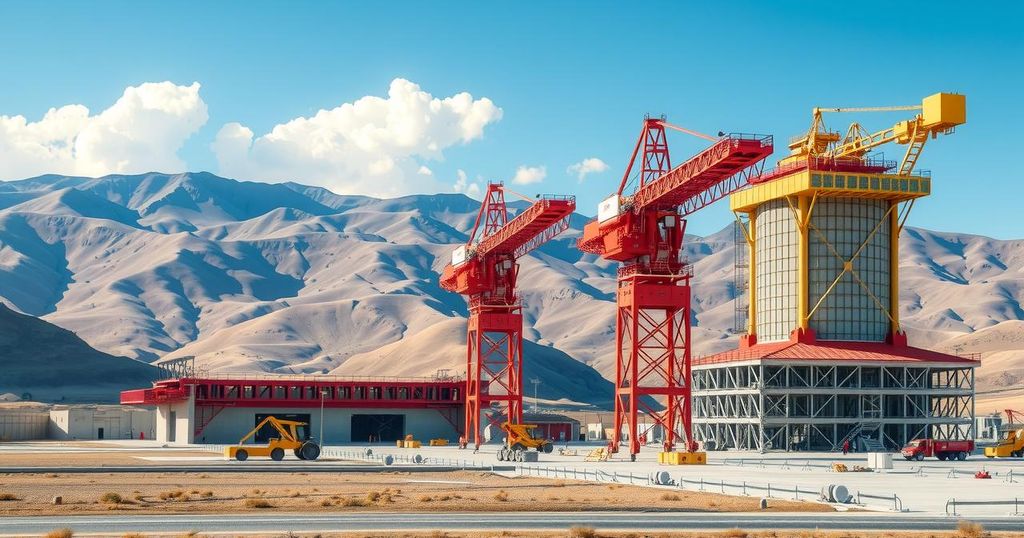Mongolia Advances Megaprojects to Transform Economic Landscape
Mongolia is pursuing megaprojects to enhance its economy by processing raw materials domestically, rather than exporting them unrefined to China. Amidst funding challenges and sustainability concerns, the government has outlined 14 key projects aimed at increasing industrial capacity and improving GDP. Recent agreements with France and China underscore progress, although public sentiments about foreign investment remain mixed.
Deep within Mongolia’s Gobi Desert, trucks daily transport coal and copper to the Chinese border, where these raw materials are further processed. For nearly two decades, the mining sector has significantly benefited Mongolia; however, leaders have begun to emphasize the importance of processing these resources domestically rather than exporting them raw. This reflects a growing public demand to retain mineral wealth within the country.
To enhance industrial capacity, government officials are designing plans for new factories and infrastructure focused on adding value to these raw materials. Deputy Speaker of the Ikh Khural, Bulgantuya Khurelbaatar, noted, “People are much more keen to see results. They also want to see their livelihoods being uplifted significantly,” thus reinforcing the necessity of large-scale projects, or megaprojects.
If Prime Minister Oyun-Erdene Luvsannamsrai successfully instigates the construction of these factories, it could lead to significant transformation in economic output, shifting Mongolia’s exports from unrefined minerals to finished products like sheets of copper and steel. This transition would enhance Mongolia’s role within global supply chains.
Despite the promising outlook, several obstacles remain, particularly concerning the funding required—estimated to be in the billions along with sustainability challenges that threaten Mongolia’s natural environment and nomadic heritage. Nevertheless, officials argue that these initiatives represent the fastest means to achieve economic goals, including increasing per capita GDP from $7,580 to $10,000.
The Prime Minister has earmarked 14 megaprojects for development, including mineral processing centers, water diversion initiatives, and power plants. Two significant projects have made headway: a uranium mine agreement with France and a cross-border rail project with China, both of which have been in development across several governmental terms.
The anticipated construction timeline for these projects is lengthy; however, advancing these initiatives supports Oyun-Erdene’s rationale for additional developments. Furthermore, enhancing energy independence is critical, particularly with the proposed 450-megawatt coal-fired power station in Tavan Tolgoi and expanded railway infrastructure.
Political maneuvering is essential for the successful implementation of these projects. The formation of a coalition government with the Democratic Party is designed to eliminate barriers to progress. “When almost half the Parliament becomes an opposition, it’s quite difficult to push forward for some of these big, megaprojects,” expressed Bulgantuya.
In considering environmental impacts, the government plans to divert water sustainably from northern rivers to the southern region, supporting mining operations while consulting with neighboring Russia. Minister of Mining, Tuvaan Tsevegdorj, emphasized the intention to preserve natural resources and nomadic culture throughout development.
Financial commitments for these undertakings are significant, with uranium mine construction funded by a $1.5 billion investment from Orano and other projects supported by foreign investments, such as a $1.7 billion oil refinery from India. The Mongolian government has notable experience attracting foreign investors but must improve relations to sustain this progress.
Public perceptions of these megaprojects are divided. Bulgantuya noted the prevalent hesitation toward changes associated with foreign investment. Politician Jargalan Batbayar expressed concerns regarding over-reliance on the mining sector and the potential for increasing national debt linked to these large-scale projects, which she predicts may yield minimal returns.
While officials acknowledge the concerns surrounding these megaprojects, with three years before the next elections, the government is likely to pursue these plans vigorously. “We understand that there are varying voices,” said Bulgantuya. ”But at the same time, these big projects support foreign and even domestic investment and still need to go ahead.”
Mongolia is strategically advancing its economy through a series of megaprojects aimed at enhancing industrial capacity and economic output. Despite significant challenges regarding funding and environmental sustainability, the government’s focus on domestic processing of raw materials demonstrates a commitment to improving the nation’s economic prospects. Successful implementation of these initiatives, supported by foreign investments, will be crucial in reshaping Mongolia’s role in global supply chains while addressing public concerns regarding resource management and national debt.
Original Source: www.bne.eu




Post Comment